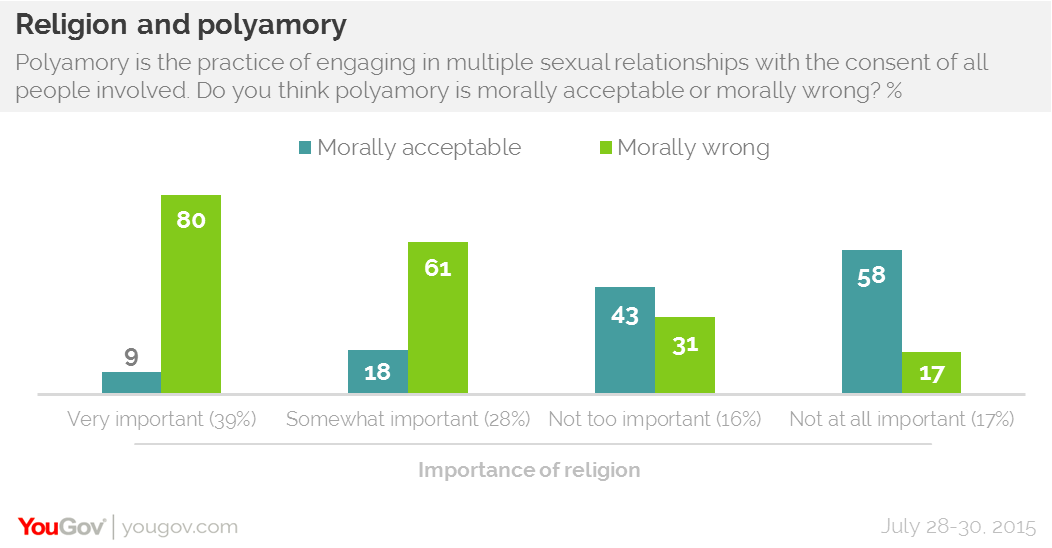The poly movement's growing atheist/skeptic wing
And we were both there because we missed the first Reason Rally in 2012.
 |
| PBS |
Most non-religious Americans condone polyamory, new survey finds
...In the new YouGov poll, 58 percent of adults who consider religion to be “not at all important” say polyamory is morally acceptable. Only 9 percent of people who consider religion very important say the same.
--------------------------------
Poly allows me to take away their motivation to lie. If they don’t love me, they know they can say so. If they love me AND someone else, they can say so. Insecurity comes from not knowing or distrusting, and poly allows me to get past both those things.
As two fairly open-minded people, our conversations eventually turned to what we liked in bed. We both were meticulous in our avoidance of diseases, but there were some stark differences between us. I liked giving back rubs. Christina liked having meat hooks pierced through her back and being suspended by wires. I wanted to be in a threesome one day. Christina had lost count of how many she’d been in. She began to call me naive, a charge to which I almost immediately pled guilty....
● Another rockstar of the movement is Greta Christina. Her latest book, just out two weeks ago, is The Way of the Heathen: Practicing Atheism in Everyday Life, with a section on "sex, love, pleasure, and joy." She's made no secret of being poly and invited Franklin Veaux to guest-post on her blog (Sept. 27, 2013).
Here's her On Monogamy and Non-Monogamy As a Continuum (Feb. 15, 2013). And a movie review, Polyamory, Pop Culture, and Propaganda: "Yes, We're Open" (Jan. 31, 2013):
So when people making movies/ TV shows etc. depict the lives of some misunderstood/ marginalized group that doesn’t get depicted in pop culture very much… what responsibilities do they have? If any?
I saw this movie last night, “Yes, We’re Open”: an indie small-budget comedy (available on DVD and download) about a San Francisco couple beginning to consider non-monogamy when they meet an open-relationship couple who expresses an interest in them....
A lot of why it was frustrating can be summed up in the question I asked the filmmakers in their post-film Q&A: “Given that the template of San Francisco poly culture is that it’s hyper-ethical, hyper-processing, talking everything to death… why did you choose to make the poly couple in this movie so skanky, and not particularly ethical?”
They clearly understood the question, and the context for it.... We don’t [yet] have our “Philadelphia,” our “Brokeback Mountain,” our “Ellen,” our “The Kids Are All Right,” our “Will and Grace,” our “Glee.” And so when a movie like “Yes, We’re Open” comes along... it’s that much more disappointing when the poly people are so skanky, and not particularly ethical.
I don’t want every poly character in every TV show or movie to be a perfect paragon of sensitivity and high-minded ethics. I’m okay with them being flawed and human....
...But given that there are so few poly characters in pop culture, and even fewer who don’t fall into the stereotype of unethical seducers and skanks with no self-control, I think producers of pop culture do have an obligation to not actively perpetuate that stereotype.
● Much more recently, on The Bayesian Conspiracy podcast: What’s Polyamory got to do with Rationalism anyway? Part 1, Part 2 (June 1 and 8, 2016).
People who practice polyamory and other styles of open relationships comprise a group that is rapidly growing in numbers and visibility. What IS polyamory, anyway? Don't we get jealous? How do we manage our schedules? Why is such a large proportion of skeptics and atheists practicing polyamory, and what issues does the community face as it moves forward?
● Kelley Clark (Kelleytastic) wrote a piece titled "Poly and Skepticism" on the now-defunct Modern Poly site that stated key points of the poly-skeptic intersection:
...I look at the world through the lenses of logic and critical thinking and I use scientifically-rigorous methodology to evaluate the world around me. What is the evidence? What are the biases? Does the data necessitate the outcome, or does it simply correlate with the outcome?
...For example, if I’m thinking about vaccinating my children, there’s a lot of information available. What is noise, what is fear-mongering, and what is accurate? Is the literature peer-reviewed? Is the study considered to be scientifically rigorous, meaning it cleanly tested the variables that it set out to test and was transparent about its limitations?
Another area I have given much consideration to is human sexuality. How many of our traditions are that way simply because that is how they have always been? What does that actually mean? How long is “always”? How many are dictated by religious beliefs, cultural norms, or other social mores?
...Where I tend to differ from some people are morals that are derived from religious dogma. I don’t choose to do so simply to be obtuse; it is my responsibility in these cases, as a Skeptic, to investigate the origins of the norm and whether or not it is a helpful or harmful tradition.
Some cultural norms end up being neither helpful nor harmful. Monogamy, for me, is one of these traditions.
In many ways, I credit my success in polyamory to my identity as a Skeptic. It allows me to step back and evaluate situations objectively. Emotion itself is a beautiful thing to experience, but I like the fact that it does not have to define me. I define myself.
● From a Washington Post column, An Atheist Guide to Love (Feb. 14, 2013):
By Libby Anne
...Without instructions flowing from religious dogma, atheists are free to simply focus on finding ways to build healthy relationships and on setting a healthy balance between self and others. Given the lack of atheist dogma, this is a very individual thing. Many atheists marry and raise children together, others get divorced, and still others choose not to marry, or form alternative families or engage in polyamory. As an atheist, there’s no set rule for what a family or a relationship is supposed to look like. Instead, it’s up to you.
“Do unto others 20% better than you would expect them to do unto you, to correct for subjective error.”
–Linus Pauling
One of my favorite books about human cognitive biases is How We Know What Isn’t So: The Fallibility of Human Reason in Everyday Life, by Thomas Gilovich. As the title suggests, it’s essentially a catalog of the various cognitive traps, reasoning errors, and other fallibilities that lead to people to “knowing” things that aren’t true.
The book talks about a lot of reasoning problems that you might expect: confirmation bias, for example, and intuitive problems with randomness (the human brain is so highly optimized for seeking patterns that it’ll find patterns even in random data, and on top of that, random data do not necessarily “look” the way we expect them to, and in particular aren’t fractal in nature; it’s perfectly reasonable to flip a coin a bunch of times and see heads come up five or six times in a row…but I digress).
...And it discusses self-fulfilling prophesies, in the context of the Prisoner’s Dilemma.
...The connection between a hostile Prisoner’s Dilemma strategy and self-fulfilling prophesies was new to me, and naturally, it instantly created a new connection between Prisoner’s Dilemma problems and polyamory in my head.
Meeting [your] lover’s other lover presents a host of opportunity for cooperation or defection. You can reach out to the other person and try to make that person feel welcome; you can be closed up and defensive to that person; you can even be actively hostile to that person. And, of course, your lover’s lover has similar choices....
...So are we left, then, with the grim conclusion that the only rational way to meet a lover’s new lover is to be defensive, even knowing that this defensiveness is likely to trigger the very thing we believe we’re defending against?
Thankfully, no....
...When it comes to human interactions, where information is not perfect, the rule of withholding cooperation only to the extent that the other person does quickly falls by the wayside. In situations where two [game-theory] programs are given occasional flawed information, a better strategy than Tit for Tat emerges: Tit for Two Tats. Tit for Two Tats will let the first perceived defection slide, and begin withholding cooperation only if it sees the other side defect twice in a row. Hence the Linus Pauling quote “Do unto others 20% better than you would expect them to do unto you, to correct for subjective error.”...
● Joreth Innkeeper, an outspoken atheist and long-term poly activist (and now a director of Atlanta Poly Weekend/ Relationship Equality Foundation), hosts large sections on atheism and polyamory on her website and sells T-shirts: Atheist Tees and Poly Tees. She does a conference presentation on the intersection between polyamory and skepticism (including running your love life by the scientific method — it's more intuitive that you think) and says she will get it up on the web this summer.
She recently appeared on the Secular Sexuality Podcast of author and speaker Dr. Darrel Ray. The episode is Poly Activist & Paradigm Shift (June 5, 2016). Her interview starts at 26:25.
● This is getting long enough. I'll close with a plug for Christopher Bingham and the Bone Poets Orchestra (formerly Gaia Consort), creator of beloved poly songs — Yes!, Perils of Poly, Family, Goodnight — and atheist anthems: Evolve, Cry Freedom, No Shadows.
Do you know of other things that belong here? Put them in the comments.
[Permalink]
Labels: atheism, skepticism


0 Comments:
Post a Comment
<< Home